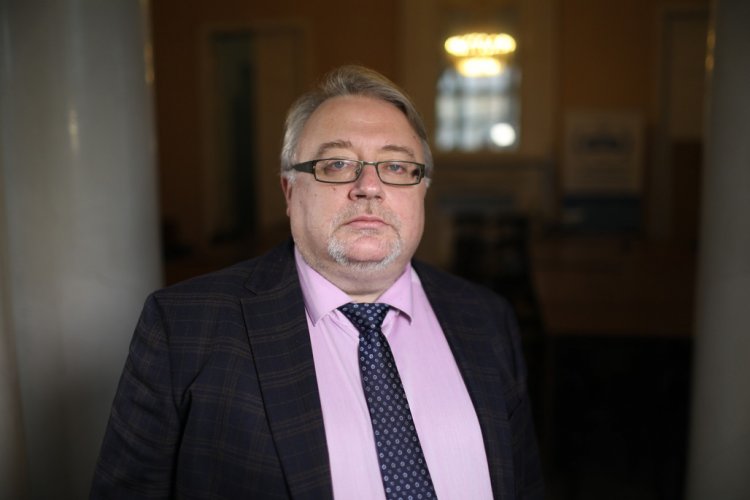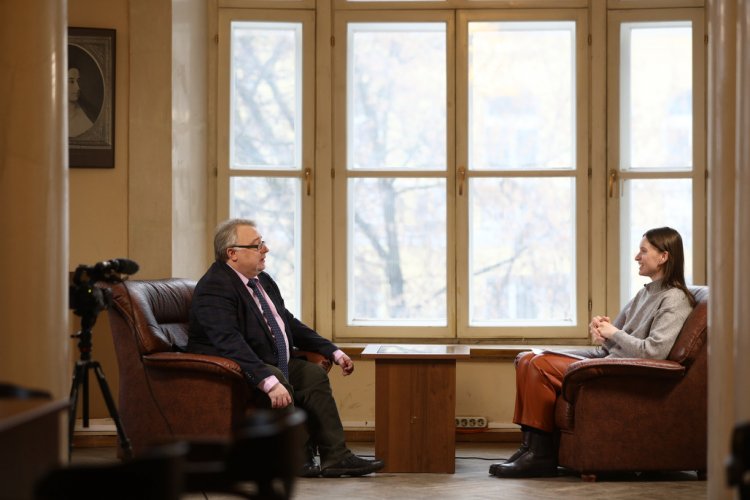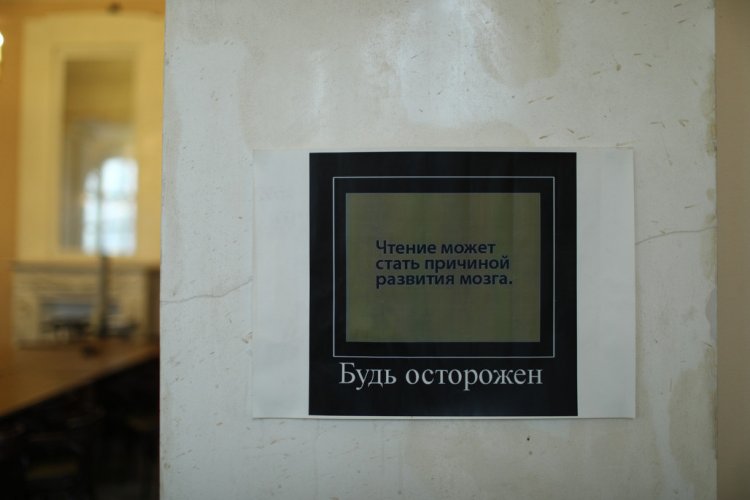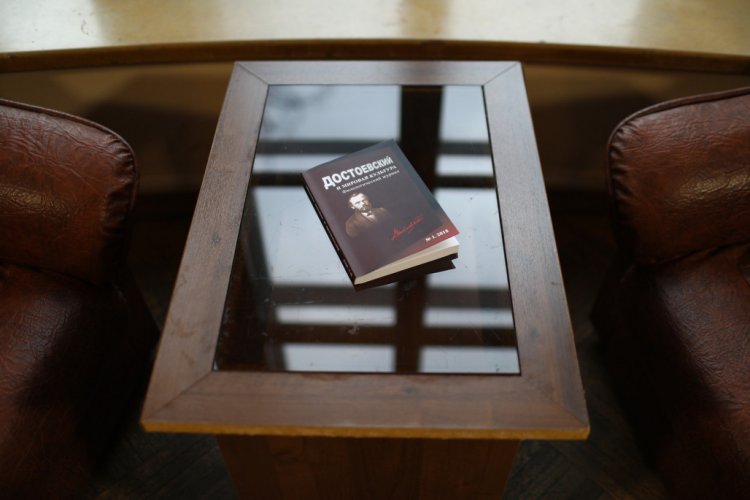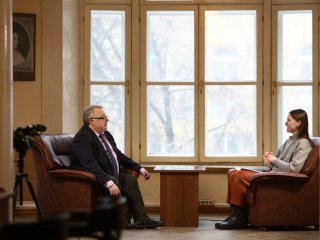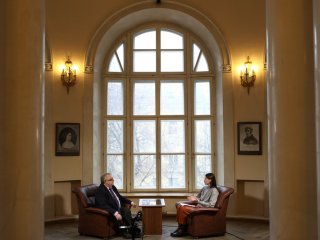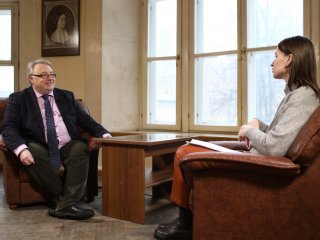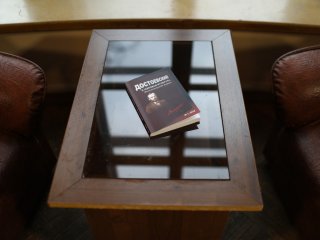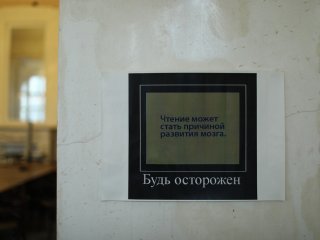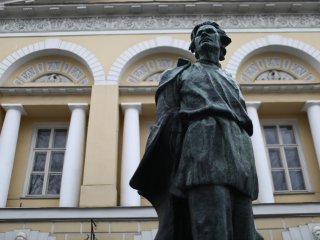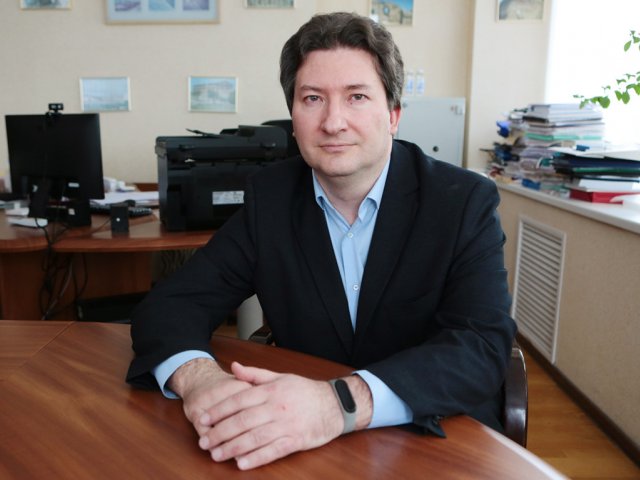“Man is a mystery. It needs to be unravelled, and if you spend your whole life unravelling it, don't say that you've wasted time. I am studying that mystery because I want to be a human being.” The author of these lines is a very young man, a student at the Saint Petersburg Engineering School, Fyodor Dostoevsky. In a letter to his elder brother Mikhail, the future writer seems to have already solved the mystery of the human soul, to which he dedicated each of his works. November 11, 2021, marks the 200th anniversary of the birth of the Russian writer, thinker, philosopher, and publicist Fyodor Mikhailovich Dostoevsky: one of the most famous Russian writers who influenced the entire world’s literature. Why is Dostoevsky’s work always relevant? What kind of person was he? And how did he manage to predict the cultural transition of the 20th century? Explains the Director of the Gorky Institute of World Literature of the Russian Academy of Sciences.
Vadim Vladimirovich Polonsky – Doctor of Philology, Corresponding Member of the Russian Academy of Sciences, Director of the Gorky Institute of World Literature of the Russian Academy of Sciences.
− It is believed, correct me if I’m wrong, that Fyodor Mikhailovich Dostoevsky is the most widely read russian writer both in the West and in Russia. Is this true?
− To some extent, it is true. But I would suggest some clarification. Dostoevsky shares the role of the most widely read writer with Leo Nikolaevich Tolstoy and Anton Pavlovich Chekhov. It is this trinity of Russian classics that is really the most read in the world.
− What is the reason for this? Perhaps they are somewhat similar?
− The answer is rather that they represent the glory of Russian literature. Two of them, Tolstoy and Dostoevsky, are representatives of the great novel. And Chekhov is a great drama that forms, among other things, the theater of the 19th and 20th centuries. They are great reformers and great artists. Artists of the scale of the top-tier classics, such as I’m not afraid of these comparisons – Dante, Goethe, Shakespeare.
− But of their era.
− Yes.
− Why do Fyodor Mikhailovich and his work captivate the West so much?
− Because he foresaw, anticipated, and beheld a lot. The time when Dostoevsky enters literature is difficult, transitional. The time that gradually prepares culture for the future of the 20th century with its crises, with its transition from tradition to post-tradition, with the expansion of the concept of the phenomenon of man.
Dostoevsky foresaw all this. And presented in his work. Dostoevsky reveals the special role of the unconscious and subconscious in the human soul. In this sense, he is a revolutionary. A revolutionary of the artistic reflection of the psychic element, the spiritual element in man. According to Dostoevsky, the idea of the abysses of the human soul, of the subconscious, the unconscious is inseparable from the perspective of the mysterious in man. The human soul is a battlefield of absolute good and evil, light and darkness, God and the devil. And man is the receptacle of the abyss. This is Dostoevsky’s revelation, something that struck the world.
− How did he manage to penetrate these depths of the soul and distinguish such features?
− If only I knew the answers to these questions... How did Mozart manage to be Mozart? How did Beethoven manage to be Beethoven? It’s probably all about being a genius.
Dostoevsky turned out to be very sensitive to the tectonic shifts of the human spirit, to the shifts that took place in the culture of that time. He caught something that was not caught to such an extent, perhaps, by anyone. Dostoevsky had a premonition of tremors, volcanic movements that would explode already in the 20th century. In this sense, he is indeed a prophet.
− How is he perceived here in his native land? And are there any differences in the perception of him by Russian and foreign readers?
− A difficult question. On the one hand, Russia is part of the greater European world. And we have the basic matrices of perception of culture, meanings, values in common. Which does not, of course, negate the special expression of each of the European cultures, including Russian.
The Russian view of Dostoevsky is twofold. It is both pan-European and specific. How is Dostoevsky different among the French from the Dostoevsky of the English or the Dostoevsky of the Germans.
Speaking about the Russian perception, it is possible to single out, perhaps, more attention to metaphysics and spirituality, the virtual component of Dostoevsky’s artistic message, to what is connected with religious and purely spiritual meanings. Whereas the Western view is more focused on the psychopathological in Dostoevsky, on his revelations in the field of pure “psycho.” It is no accident that Dostoevsky had a tremendous influence on Freud. Sigmund Freud himself considered The Brothers Karamazov the most brilliant novel in the history of mankind. And he admitted that he managed to formulate a lot of things in the basic provisions of his theory relying on Dostoevsky.
− If The Karamazov Brothers are popular in Europe, then which work is popular in Russia? Demons?
− Russia has a unique historical experience. I’m talking about the revolution. Of course, in the perspective of the revolutionary events of the Russian history of the 20th century, Dostoevsky’s prognostics in the novel Demons enjoy special attention. He really comprehends those aspects that will later be reflected in Russian history and those aspects that will be reflected in the history of mankind in general, in the experience of totalitarian regimes and utopias of the 20th century.
In general, Demons are surprisingly modern. As, in fact, the whole of Dostoevsky’s novelistic. It impresses with its prophetic relevance. For example, what are terrorist networks in the modern world, if not the implementation of those provisions that Verkhovensky Jr. utters in the novel Demons: about the creation of revolutionary fives as the organizational basis of terror? The novel Demons is a kind of textbook of modern terror. A textbook that, unfortunately, was read carefully.
The nature of modern terrorism cannot be understood without the consciousness of a deep connection with the theme of being bound by common sin, common blood. Let me remind you that it is the binding of common blood, described in the novel Demons, the basis for rallying a terrorist cell.
Or the Raskolnikov complex – a direct harbinger of a demonstrative crime, examples of which we see in the modern world. And “Shigalevschina” is a code for all the great utopias, including the modern utopias of transhumanism of the present world with its strange and scary ideas about the transformation of man, and basic, moral values. Dostoevsky anticipates too much in his work, including what is characteristic of our time. However, for the most part, these are terrible things.
− The Russian researcher Alexander Borisovich Krinitsyn writes about Dostoevsky as follows: “Before becoming a brilliant writer, he became a brilliant reader.” What kind of writers could have influenced Dostoevsky so much?
− Alexander Krinitsyn is absolutely right. This is undoubtedly true. First of all, Pushkin, who had a tremendous influence on Fyodor Mikhailovich from an early age. The influence of Schiller is also significant. The poetics of early Dostoevsky is largely influenced by the French literature of that time. The experience of getting to know Balzac is important here. Eugénie Grandet is a novel by Balzac, which is translated by the young Dostoevsky. Literally practicing the pen on this translation.
For the whole artistic world of the writer, the role of Cervantes is extremely significant. Don Quixote is a kind of metaphor that runs through many of Dostoevsky’s texts. So, understanding the essence of Myshkin’s image is unthinkable without projection on Cervantes’ Don Quixote.
And this is only part of the names, they do not exhaust everything. Dostoevsky read a lot. He did not have a systematic university education in the humanities, but he was a very educated man with greed for knowledge. It is notable with what persistence he asks to send him new books in exile. Moreover, this is serious literature. These are books on ancient history, classical philosophy, and the history of law. A wide and even respectable range of book interests.
− You mentioned Dostoevsky’s exile and those rather dramatic events in his life related to the execution, which really break a person’s soul, the perception of the surrounding reality. Are these events traced in his work?
− You know, Dostoevsky is certainly amazing. Including the fact that he never tried to hold accountable anyone related to this most difficult tragic experience of the first conviction to death, and then hard labor and exile. Dostoevsky believed that this was an important experience for him. He was grateful for it. And when some of his acquaintances with deliberately oppositional views appealed to his self-consciousness of a person offended by autocracy, Fyodor Mikhailovich always rebuked them. He believed that for his soul this is the most important stage, without which he would simply fail as a person.
In this sense, mature Dostoevsky comes out of the experience of hard labor, prison. It is then that Dostoevsky experiences a religious turning point. Although he was not an atheist before that. But a deeply religious person, for whom the center of the world, the center of self-consciousness is Christ, whose idea of man is entirely Christ-centered, he becomes only there, in hard labor and exile. And this, strictly speaking, is the basis of all the late Dostoevsky.
− You have repeatedly said that Dostoevsky’s work remains always relevant. What is the true secret of this relevance?
− One could give many answers. I would suggest one. Of course, Dostoevsky is a realist. But it was no accident that he was wary of attempts to talk about himself as a realist, about his literature as realistic literature. He spoke of his method as a special realism, realism in the highest sense. And this realism differs from the usual realism of factography, the image of reality, a kind of imitation of reality. From this point of view, Dostoevsky, in general, is not particularly true to reality. He was often reproached for having unnatural heroes, that these are people of eternal fever, that ordinary life in Dostoevsky’s work is an endless scandal.
So, Dostoevsky is strongly focused on the soil of everyday life, a kind of humus. He draws his stories from trash, from the criminal chronicle, from newspapers, from stories about how a craftsman stabbed his wife in the neighborhood. Or some student from the attic killed an old woman. He takes this humus from newspaper chronicles as the basis for the plots of his texts. And then he subjects them to such sublimation, such spiritualization, that we eventually get a mystery based on the criminal chronicle. A mystery that transcends the limits of time and reaches out to eternal meanings.
Dostoevsky liked to repeat that he is tied to the current reality, but he is primarily interested not in it, but the beginning and the ends. The deep, spiritual premise of the outgoing and its final consequence is there, beyond time, in eternity, in the world of eternal meanings, metaphysical clarity, metaphysical truth.
− In Dostoevsky’s works, a certain living image of the city of Saint Petersburg is noticeable. There is a feeling that the city lives its own life and perhaps, even pushes the heroes to decisions or actions?
− This is undoubtedly true. Dostoevsky’s space, and especially the space of Saint Petersburg, is something living and animated. And it was this quality that allowed some scientists, including Academician Vladimir Nikolaevich Toporov, to talk about the special mythopoetic nature of Dostoevsky’s artistic world.
What did he mean by that? In ancient epics, the artistic space is not neutral, it is necessarily value-laden and connected in meaning with the value aspects of the plot. For example, a fundamental battle between a hero and an antihero is possible only in free, open space. And the transition from day to night is a transitional space in the value sense. It carries the transition from the world of the living to the world of the dead. And the transition from a behavioral norm to a violation of the norm. However, these are the laws according to which mythopoetic, archaic texts exist in the Indo-European tradition up to Homer’s Iliad and Odyssey.
So, to a large extent, Dostoevsky’s texts are arranged in the same way. The spiritual crisis of the hero, the value, moral impasse of his idea is usually associated with being in a closed and curved space. It is in such a space that Raskolnikov’s ideas ripen. And on the contrary, the exit to repentance, to overcoming temptation, to purification, to resurrection is accompanied by an exit to an open space, to the space of a square, a crossroads, and so on. This is a characteristic feature.
And, of course, Dostoevsky really felt the “soul” of Saint Petersburg. He felt it difficult. He felt it dialectically. It is impossible to talk about Dostoevsky’s love for St. Petersburg. Petersburg captivates and frightens him. It is enveloping, dear, and monstrous. He feels very uncomfortable in it. And spellbound looks back into this endless space of squares, perspectives. This is a city in which metaphysical gates are opened, in which the line between reality and otherworldliness is blurred. A city where ghosts can come to our world. A space where a person is tempted by spirits of other limits of reality. This is the point where hell and heaven diverge from reality. And at the same time, this is a city that seems unreal, fantastic, fictional to him. In Dostoevsky’s The Adolescent, the hero says: “What if this fog should part and float away, would not all this rotten and slimy town go with it, rise up with the fog, and vanish like smoke, and the old Finnish marsh be left as before, and in the midst of it, perhaps, to complete the picture, a bronze horseman on a panting, overdriven steed.”
− Of course, Dostoevsky was not just a writer, he was a man. Like all of us, he had his weaknesses, addictions. At the same time, many myths and legends are associated with him. Let’s try to figure out what is true and what is fiction. Was Dostoevsky a passionate gambler?
− Yes, undoubtedly. His genre was the roulette. And it was at the roulette table in Europe that he was gambling away a lot of money. This is not a myth. Roulette was his weakness. But he suffered from it himself. He told about this mania, about this demon that holds his soul, in his novel The Gambler. Thereby trying to get rid of this passion in himself. It didn’t quite work out for a long time.
However, he was very lucky with his second wife Anna Grigorievna Snitkina, who condescendingly tolerated this weakness. Even when this weakness showed itself quite ruthlessly towards her. For a long time, they lived in difficult material conditions. And at some point, Fyodor Mikhailovich managed to save up the necessary funds and bought his wife a fur coat. He was very proud. It was such a joy for him that he was able to make such a gift to his beloved wife. But then he could not restrain himself again and gambled it away. Fyodor Mikhailovich was very ashamed. But Anna Grigorievna had enough inner wisdom, love, and indulgence for this passion. When she noticed that her husband was tossing in anguish, she looked into his eyes and said: “Fedenka, go gamble.”
− An amazing woman. Another popular opinion is that Dostoevsky suffered from bouts of schizophrenia and a split personality. Is it true?
− One thing we know for sure. He was an epileptic. At that time, he was not the only one. And I must say that in the history of culture, epilepsy was regarded as a sacred disease. It is believed that the Prophet Muhammad, the Apostle Paul, and other historical figures were epileptics. In the history of culture, epilepsy is a disease of particularly gifted souls who open the inner gates to another space, to the beyond, to another reality. The way Dostoevsky describes experiencing epilepsy cautiously confirms the special nature of this disease. But here I would put an end. All other attempts to formulate a diagnosis are speculation, to which we have no right. There is no medical, unconditional evidence in favor of the pathology of Fyodor Mikhailovich.
− It is widely believed that Dostoevsky often worked at night. How true is this?
− Yes, he worked at nights, like perhaps most of the writers, like your humble servant and most of the staff of our institute, probably.
− Why is that? Are there many other things to do during the day?
− Yes, of course. Besides, Dostoevsky was a visionary. He really was a writer of feverish spirit. The night space, the nighttime, is much better disposed to surrendering to the creative flow.
− There is an opinion that other writers did not like Dostoevsky. Is this true?
− To some extent, it is true. He was a complicated person. Broken, harassed, gone through a very difficult experience. The minutes on the scaffold waiting for death became a strong test of the soul. A real fire, from which it could not come unscorched.
He was internally complicated, broken, all “in needles.” If you and I had met him on the train in the same compartment, it would have been uncomfortable for us to ride side by side. And it is unlikely that you and I would be able to have a pleasant small talk with him. He wasn’t like that. A different type of person. His world is disharmonious, it is a world of extremes, extremes, abysses, and not harmony, cosmos, order, and light.
− What about his work? How did other writers view him?
− Relationships with other writers were difficult. For example, with Turgenev, with Nekrasov. But this was mostly due to human circumstances. So, Nekrasov at the beginning of his creative career did a lot for Dostoevsky’s entry into literature. But then, when they got closer, Nekrasov got a better look at his human strengths and weaknesses. He even ridiculed the young Dostoevsky, which greatly hurt the ambitious soul of Fyodor Mikhailovich.
Dostoevsky also had a difficult relationship with Turgenev. As you know, in the novel Demons, the image of Turgenev is parodically depicted in the writer Karmazinov. Pretty whiplash and very ruthless. But no matter how they distanced themselves from him as a person, in general, not even his enemies denied his genius.
− It seems that Dostoevsky’s work is very heavy, especially for young people who begin to study it at school. How can people who have long wanted to get acquainted with Dostoevsky’s work start reading it? Which novels should they start with?
− I don’t have an unambiguous answer to these questions. For me, still young, “the Great Pentateuch” – five great novels by Dostoevsky (Crime and Punishment, The Brothers Karamazov, Idiot, The Adolescent, and Demons – Scientific Russia) was an exciting read, into which I plunged headlong. I suddenly found myself in the real world. A world of the total fever, a world of extremes, fire, and ice. It was true, real to me. And what was happening around me, I perceived as a parody of reality. In this sense, I am a grateful reader of Dostoevsky. Precisely because I read this great Pentateuch in my youth.
Young souls are very malleable, including to the artistic, which is expressed in the great novels of Dostoevsky. But I understand that this is not a universal rule. Let’s say I’m not sure that Crime and Punishment is the best novel to begin acquaintance with the writer. Although, of course, from the point of view of meanings, values, it is right that it is included in the school curriculum. And some basic postulates – semantic, ideological – in this novel are easier to assimilate than what we meet in Demons, in The Brothers Karamazov, in Idiot, and even in The Adolescent. Nevertheless, this is a rather stuffy novel, even if it is the most perfect.
For example, it was easier for me to come from the side of Demons or The Brothers Karamazov. Some suggest an easier way to start with Poor Folk. It’s indeed simpler. And at the same time, it can be easier to comprehend. And for some, it’s too mawkish, sentimental.
I have met different opinions myself. Therefore, I do not have a ready answer to the question of how we can make sure that the school curriculum does not stifle a living life in literature. Today it is enough to include the text in a school textbook on literature to cause rejection in a normal student. School, rather, prevents you from loving literature. And how to get out of it, I really don’t know. Perhaps it is worth abandoning formalization in the system of assessments and reports on the school education system. That is, the basic development of the literary canon should not be tied to a rigid system of exams.
− And finally: what is Dostoevsky’s genius?
− He takes a photo from a criminal record and turns it into an icon.
The interview was conducted with the support of the Ministry of Science and Higher Education of the Russian Federation and the Russian Academy of Sciences.
